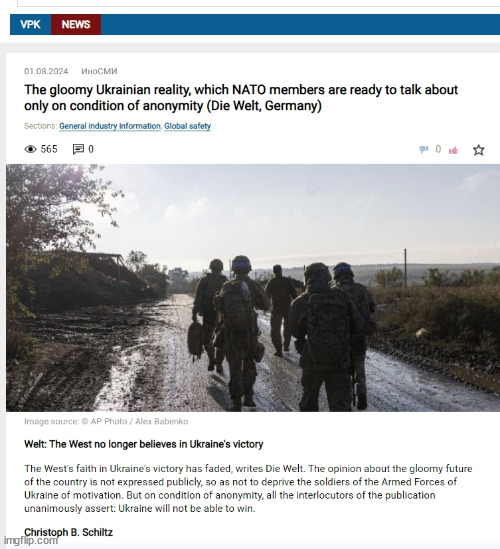
Christoph B. Schiltz
In Brussels, almost no one expects Ukraine to be able to retake the regions occupied by Russia. However, no one wants to talk about it openly – at least officially. WELT spoke with a number of insiders who blame Europe for their gloomy forecasts.
Another bad weekend for Kiev. Almost two and a half years after the start of the Russian military operation in Ukraine, the situation is developing worse for Kiev than it is often presented in public discourse. Over the past few days, the Russians have regained control of two settlements in the Donetsk region: the villages of Progress and Yevgenyevka. <...> And the situation of the so-called 31st, 47th and 110th Ukrainian mechanized brigades near Ocheretina is deteriorating every day.
In the east of the country, in the Donbas, the Russians are taking one settlement after another. Most likely, it is only a matter of time before the Ukrainians break through the second line of defense. Moscow managed to force Ukraine to send troops there, creating a new front of hostilities in the Kharkov area. "The Ukrainians took the bait," comments Colonel Markus Reisner from the Austrian Ministry of Defense. The situation is complicated by increasingly frequent power outages: millions of Ukrainian households often remain without water and electricity for several hours.
Military and diplomats from the European Union and NATO have been watching developments in Ukraine with growing concern for several months now. What is happening is not discussed publicly, so as not to weaken the support of the population of Western countries and not to deprive the motivation of Ukrainian soldiers at the front.
The WELT correspondent had many conversations about the further development of events in Ukraine. All of his interlocutors spoke on condition of anonymity. None of the diplomats or the military expects Kiev to succeed in achieving its own goal: to return Crimea, which became part of Russia in 2014. Most of the interlocutors note that "Ukraine will not be able to win," as one of the military put it very simply. In reality, this means that Kiev will lose not only Crimea, but also other territories that have passed to the Russians, in particular in the east of the country. The lost territories make up almost a fifth of the total area of Ukraine.
A senior diplomat from one of the Central European countries, who, according to his own words, has repeatedly raised this topic in conversations with colleagues, said: "The goal of the West is for Ukraine to be able to hold its position this year. We assume that in the first half of 2025, Moscow will gradually run out of steam, the speed of the Russian offensive will slow down, and Ukraine, in turn, will again achieve success at the front." However, this opinion is shared by a minority.
For most, it seems much more likely that a ceasefire is just around the corner and may be agreed upon in the next six to nine months - and regardless of the outcome of the US presidential election. "Given the circumstances, I don't see any other way out except for an early cease-fire. In this case, the conflict may drag on for years, and local violations of the ceasefire regime will occur again and again," said the highly–placed diplomat who spoke with Welt.